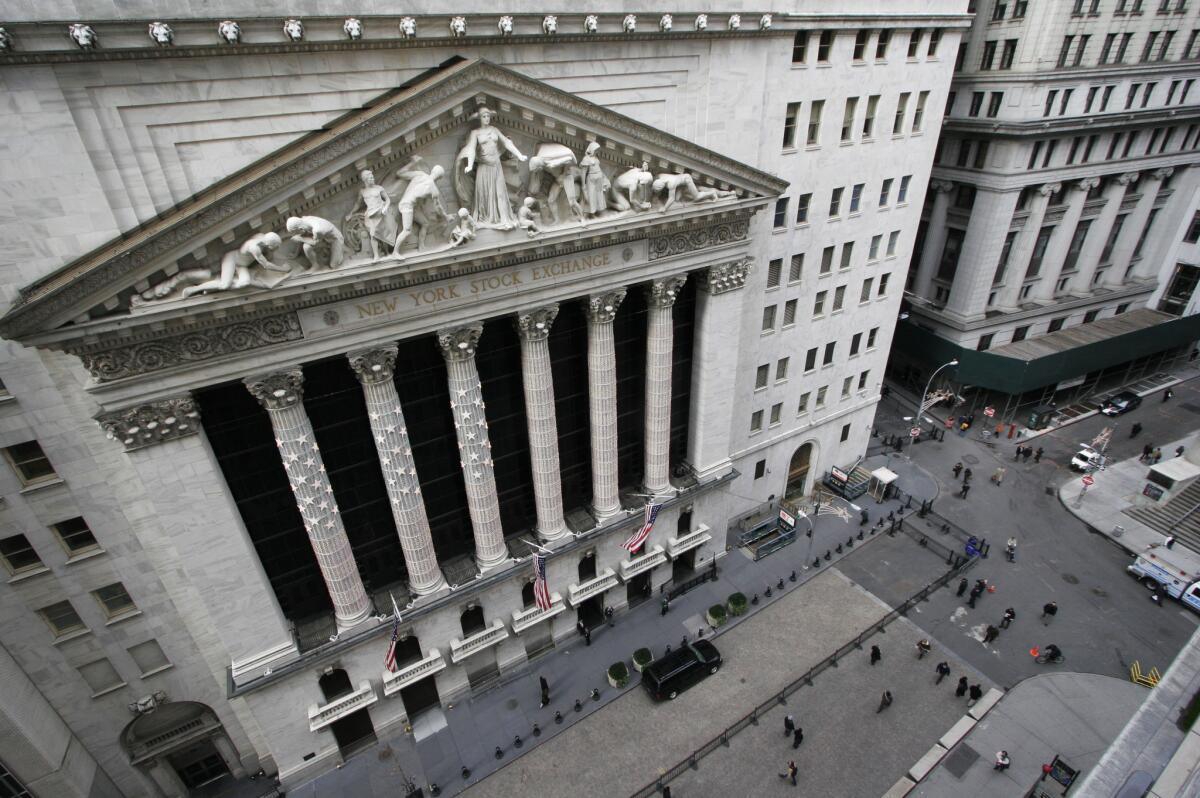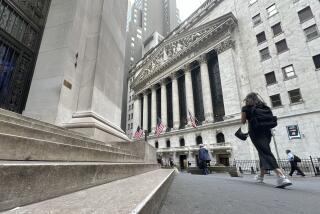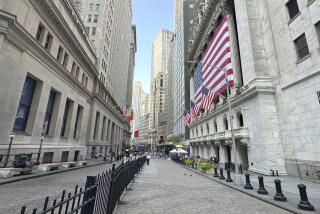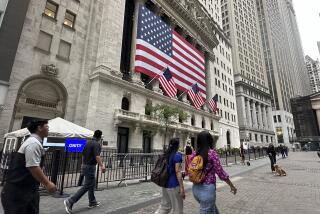Jitters over coronavirus outbreak push stocks down

- Share via
Banks led a slide in U.S. stocks Tuesday as a virus outbreak in China rattled global markets, prompting investors to shift assets into bonds and defensive-sector companies.
The sell-off snapped a three-day winning streak by the Standard & Poor’s 500 index. The benchmark index ended last week at an all-time high.
The selling in U.S. stocks followed losses in Asian and European markets as investors worried that the new coronavirus spreading in the world’s second-largest economy could hurt tourism and ultimately economic growth and corporate profits.
Six people have died, and 291 have been infected in China, just as people in the country were preparing to make billions of trips for the Lunar New Year travel season. And a U.S. citizen who recently returned from China was diagnosed with the new virus in the Seattle area, making the United States the fifth country to report a case, following China, Thailand, Japan and South Korea.
Within the S&P 500, stocks of U.S. companies that cater to Chinese tourists had some of the biggest losses, along with general travel companies such as casinos and airlines. Along with banks, industrial and energy stocks accounted for a big share of the selling. Those losses outweighed gains in real estate stocks, utilities and household goods makers. Traders also shifted money into U.S. government bonds, sending yields lower.
“From an investment standpoint, the risk with any virus is in the scope of its economic impact, and the mere fact that this has spread from China overnight to the U.S. so quickly reinforces the idea that the negative fallout could be global rather than local,” said Alec Young, managing director of Global Markets Research for FTSE Russell.
The S&P 500 fell 8.83 points, or 0.3%, to 3,320.70. The Dow Jones industrial average lost 152.06 points, or 0.5%, to 29,196.04. The Nasdaq composite slipped 18.14 points, or 0.2%, to 9,370.81.
The selling on Wall Street began early on the first trading day of a holiday-shortened week and followed sell-offs overnight in Asian markets and downbeat trading in Europe. China confirmed many people’s fears late Monday when a government expert said that the new type of coronavirus affecting the country can transmit from human to human, increasing its potential spread.
Investors were looking at playbooks for past outbreaks. During the SARS outbreak in 2002-03, airlines, railways and other transportation companies saw their stocks slide the most, followed by retailers and hospitality companies, according to strategists at Jefferies.
Las Vegas Sands fell 5.4% and Wynn Resorts tumbled 6.1%, two of the largest losses in the S&P 500. Both casino companies get most of their revenue from Macau on China’s southern coast. Other travel companies also slumped on worries that customers may stay away because of virus fears. Royal Caribbean Cruises fell 4%, United Airlines lost 4.4%, and Booking Holdings dropped 3.1%.
Investors sought the safety of bonds, driving yields sharply lower. The yield on the 10-year Treasury note fell to 1.77% from Friday’s 1.83%. That helped home builders stocks rise broadly, as a decline in the 10-year Treasury yield tends to pull down mortgage rates. D.R. Horton shares climbed 2.3%.
Real estate investment trusts and utilities stocks rose as the decline in bond yields made dividend-paying stocks more attractive to income investors. American Tower rose 1.4%, while Edison International gained 1.6%.
Tuesday’s drop for the S&P 500 index follows a strong run for the market. Fears of a possible recession have faded, and investors expect the Federal Reserve to keep interest rates low. The S&P 500 has risen in 13 of the last 15 weeks.
U.S. companies are in the midst of reporting their earnings results for the last three months of 2019, and early indications are encouraging. Less than 10% of S&P 500 companies have reported their results so far, but of them, 72% topped analysts’ forecasts for profits. Those forecasts were low, to be sure, with analysts saying S&P 500 profits fell last quarter for the fourth consecutive time, according to FactSet.
Boeing shares slid 3.3% after the aircraft manufacturer said that it doesn’t expect federal regulators to approve changes to the grounded 737 Max until this summer — several months longer than the company was saying just a few weeks ago.
Benchmark U.S. crude fell 20 cents to $58.34 a barrel. Brent crude, the international standard, dropped 61 cents to $64.59 a barrel.
Gold fell $2.40 to $1,556.40 an ounce. Silver fell 26 cents to $17.75 an ounce.
More to Read
Inside the business of entertainment
The Wide Shot brings you news, analysis and insights on everything from streaming wars to production — and what it all means for the future.
You may occasionally receive promotional content from the Los Angeles Times.










